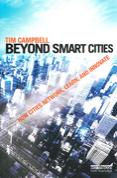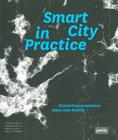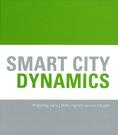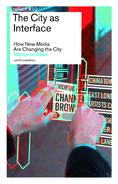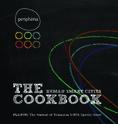inu regulation urban projects mobility premio tesi di laurea economics competition fragile territories rigenerazione urbana call for articles waterfronts & harbors globalization sociology participation welfare transport & logistics commerce large scale plans & projects dottorati conservation & preservation paesaggio educational technology democrazia local development
Beyond Smart Cities.
How Cities Network, Learn, and Innovate
Tim Campbell
The promise of competitiveness and economic growth in so-called smart cities is widely advertised in Europe and the US. The promise is focussed on global talent and knowledge economies and not on learning and innovation. But to really achieve smart cities – that is to create the conditions of continuous learning and innovation – this book argues that there is a need to understand what is below the surface and to examine the mechanisms which affect the way cities learn and then connect together.
This book draws on quantitative and qualitative data with concrete case studies to show how networks already operating in cities are used to foster and strengthen connections in order to achieve breakthroughs in learning and innovation. Going beyond smart cities means understanding how cities construct, convert and manipulate relationships that grow in urban environments. Cities discussed in this book – Amman, Barcelona, Bilbao, Charlotte,Curitiba, Juarez, Portland, Seattle and Turin – illuminate a blind spot in the literature. Each of these cities has achieved important transformations, and learning has played a key role, one that has been largely ignored in academic circles and practice concerning competitiveness and innovation.
CONTENTS
PART I. The changing place of cities in the urban age
1. Overview
2. The slow emergence of learning cities in an urbanizing world
3. Cities as collective learners: what do we know?
PART II. Framing a view
4. A gamut of learning types
5. Light on a shadow economy: city learning in 53 cities
PART III. Crucibles of learning: proactive learner-reformers
6. Informal learners—Turin, Portland and Charlotte
7. Technical learning: Curitiba and city think tanks
8. Corporate styles: Bilbao, Seattle and others
9. Clouds of trust in style
PART IV. Secrets of a knowing and accelerating change
10. Taking stock: why some cities learn and others do not
11. Turning the learning world upside down— pathways forward in policy and research
ABOUT THE AUTHOR
Tim Campbell has worked for more than 35 years in urban development with experience in scores of countries and hundreds of cities in Latin America, South and East Asia, Eastern Europe, and Africa. His areas of expertise include strategic urban planning, city development strategies, decentralization, urban policy, and social and poverty impact of urban development. He is chairman of the Urban Age Institute, which fosters leadership and innovation between and among cities in areas of strategic urban planning, urban policy and management, sustainable environmental planning, and poverty reduction. Campbell retired from the World Bank in December 2005 after more than 17 years working in various capacities in the urban sector.




Planum
The Journal of Urbanism
ISSN 1723-0993
owned by
Istituto Nazionale di Urbanistica
published by
Planum Association
ISSN 1723-0993 | Registered at Court of Rome 4/12/2001, num. 514/2001
Web site realized by ChannelWeb & Planum Association | Powered by BEdita 3
